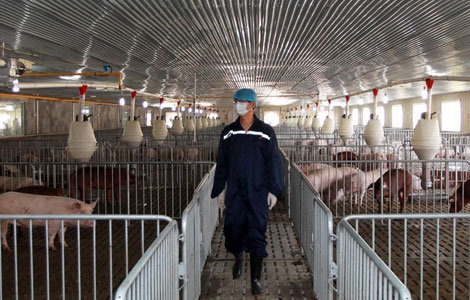
Taoist abbot Yuan Zhihong has a complicated attitude toward money: He knows his temple needs funds to make ends meet, but the commercialization of religious venues is affecting their sacred status.
"At some public memorial ceremonies, people have paid more than 1 million yuan ($163,000) to light the first incense stick," he said. "The religion has become too secular in many places."
The 58-year-old abbot at Beijing Dongyue Temple made the remarks at an eight-day seminar organized by the State Administration for Religious Affairs and attended by about 130 Taoists and religious officials, in Beijing's suburban Changping district in mid-May.
During the event, Taoists heard lectures on religious canon and discipline, China's laws and regulations, and domestic and foreign policy. Participants also discussed topics such as the commercialization of religious venues.
A Taoist for 31 years, Yuan said religious venues have received more donations in recent years as the economy has grown, yet he lamented that many temples have become profit-driven, which is contrary to the nature of the religion.
Taoism originated in China before the Qin Dynasty (221-206 BC) and has long permeated everyday life, as it exerted great influence on social customs in ancient China and on the shaping of the national consciousness.
At its core is dao (the way), which is beyond description, according to the Chinese Taoist Association. Taoists believe dao is the origin of the universe, the basis of all existing things, the law governing their development and change, and the ultimate god of Taoism.
Worshippers should not only cultivate dao but also accumulate virtue. Derived from the foundation of dao and virtue are a whole set of principles, including non-action, non-passion and non-desire, non-struggle and the pursuit of simplicity and truth.
A tool for profits
However, Li Zhijin, deputy director of the Hebei Provincial Taoist Association, who attended the seminar, complained that many Taoists now care about nothing other than money. "They ignore the disciplines and don't observe the rituals," he said.
During a 2011 memorial in Huaiyang county, Henan province, a Taoist temple auctioned off the privilege of lighting the first joss stick for 1.18 million yuan to an entrepreneur. The action led to a public outcry.
Wang Ka, a professor of religious studies with the Chinese Academy of Social Sciences, said commercialization has ruined the reputation of many religious venues.
"Ticket prices for some renowned temples are higher than 200 yuan, which is unaffordable for many people," he said in a lecture at the seminar. "The religion should not be used as a machine to make money."
Religious staff should stick to the disciplines and be dedicated to the religious issues, he added.
The seminar was part of a campaign launched this year by the State Administration for Religious Affairs to "enhance religious discipline".
Wang Zuoan, director of the administration, said in an article in Study Times in April that many temples have been contracted to companies and become a tool to make profits, which should be forbidden.
Religious venues nationwide should try to build harmonious temples and cathedrals, Jiang Jianyong, deputy director of the administration, said at the opening ceremony of the seminar.
In a statement on May 17, Zhoushan city's religious affairs administration in Zhejiang province announced it had punished 11 Taoist workers who violated the discipline. Of those 11, eight were expelled from the temple where they worked.
To better regulate venues, the State administration vowed to enhance discipline. In a notice released in March, it pointed out that many religious venues are too commercialized.
Some religious staff members do not have strong beliefs, they ignore discipline, manipulate religion to collect wealth, pursue fame and gain, and indulge in pleasure and comfort, the notice said.
The authority required the religious venues nationwide to be more dedicated to the development of religion rather than the pursuit of money.
Keeping up with times
Apart from religious discipline, the Taoism seminar also touched on China's religious laws and policies.
Wang, the professor, said religious officials and clergies should have basic political knowledge, from which they can better communicate with the government.
China is a socialist country. Socialism has different meanings in different times and religious people should keep up with the times, he said.
"The core meaning of China's socialism is the reform and opening-up in the 1980s, the Three Represents (put forward by then-president Jiang Zemin) in the 1990s, the Scientific Outlook on Development (put forward by then-president Hu Jintao) in the 2000s, and the 'China Dream' — the rejuvenation of the nation," he said.
Knowing the country's policies well could help religious groups win more support from the government, he said.







